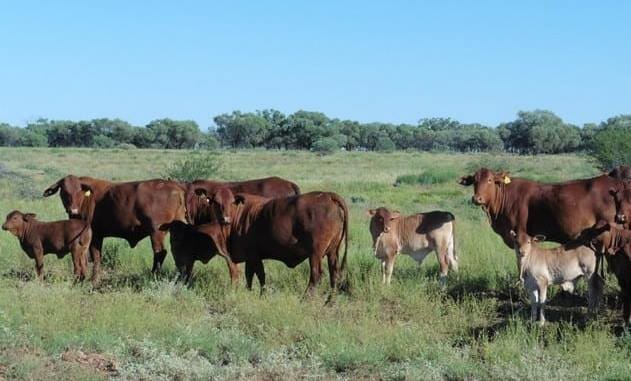
Diamantina channel country property Cambeela was passed in soon after online auction last month, but sold soon afterwards for $182/ha bare.
COVID-driven people movement restrictions on property auctions are slowly easing across the country.
This week’s property review looks at the pros and cons of the digital auction platform adopted by agents during the six-week ban on travel and direct inspection since March.
Is online property selling here to stay, or will traditional physical auctions return to dominance?
Jez McNamara, Ray White Rural Queensland
When the COVID-19 restrictions hit, Ray White Rural had to adapt and change the way it conducted online auctions.
The agency had in fact been running some online auctions for seven or eight years, but the previous methods weren’t acceptable under the new regulations due to the physical number of people allowed in an auction room.

Jez McNamara
Jez McNamara from Ray White Rural Queensland said the new technical capabilities had been well received by both vendors and buyers since March.
“It is a straightforward transparent process that is similar to Zoom, Google Hangouts or FaceTime. It is easy to see what is going on, and where the auction is up to,” he said.
Mr McNamara said issues surrounding internet services and connections could be overcome with a phone bidding authority acting on behalf of buyers.
“Giving agents the ability to act as phone bidding authorities enables them to act on behalf of buyers, and if there is a problem, the auctioneer will slow down the process. Auctioneers are fully-briefed on the whole campaign and in the end, it is all about trying to achieve the best result for the vendor.”
Values – more or less?
Mr McNamara said to date, nothing had changed in terms of auction outcomes across the board.
“A buyer and a vendor will agree on a level, whether it be over the phone, face-to-face, or in-room or online auctions. Vendors (using the new online platform) have been happy with their sales results on auction day and when properties are passed in, we negotiate afterwards with interested parties.”
In terms of interstate participation, Mr McNamara said nothing had changed.
“Logistically there are some barriers, but they can be overcome. Interested interstate parties can apply for a state government exemption in order to travel across the border to inspect a rural property.”
“I have a party in New York who sent a family member to inspect a property. Another from South Australia recently did the same thing – he sent a cousin on his behalf, who then then proceeded to make an offer,” he said.
The new norm
Mr McNamara said there have been a number of positive elements of the new digital platform that RWR will retain, even after COVID limits are lifted.
“For instance, DocuSign is a way to sign electronically on different devices. The ability to execute contracts online not only saves time, but paper. The adoption of DocuSign and online meetings (across the network) have created better efficiencies. In general, it has been a good learning experience and a step forward in the real estate industry,” he said.
RWR suggests it may conduct in-room auctions as early as July. Just like a cattle saleyard, Mr McNamara said there was more atmosphere, and a better selling and buying environment.
Matthew Kennedy, Kennedy Rural
Cambeela, in the Diamantina Channel Country was Kennedy Rural’s first online-only property auction this year, and principal Matthew Kennedy invited me to sit in on the process.

Matthew Kennedy
The auction last month was delayed by 10 minutes to allow one interested party to join the Zoom meeting. During the auction process, another interested party had trouble unmuting himself so he could bid.
In the end, two neighbours battled it out for the 19,236ha bullock fattening operation, owned by Les and Margaret Deen.
Less than 12 months ago, Todd Cormack (Black Gully Droughtmaster Stud) had purchased the adjoining 232,000ha, Narcissus, from Tom Brodie (Brodie Agencies) for $3.3 million.
Cambeela was passed in at auction, but Mr Cormack emerged as the successful purchaser, paying $3.5m bare ($182/ha).
Mr Brodie, who acted on Mr Cormack’s behalf, found the online process extremely convenient, but also awkward.
“The online auction was a first for me and my buyers. We experienced some technical difficulties, and as result found the process frustrating. No doubt practice makes perfect, but in-room auctions are my preference. It gives an agent the ability to assess who is in the room, who is bidding and who is genuine.”
Matthew Kennedy from Kennedy Rural said the online platform did the job, but it did have its limitations.
“Everyone was happy to participate, but not everyone was prepared. Some didn’t understand the digital platform and had trouble using it. My advice would be to download the technology a few days prior to auction day and have a practice run,” he said.
Mr Kennedy doesn’t believe the online process flows as well as an in-room auction.
“Selling property is slower than selling cattle. The auctioneer patiently waits for responses, then looks and listens to ensure other bids are heard and registered.”
He said the process of any sale can take time.
“If a property is passed in, it can take hours, days or a couple of weeks to reach the best result for the vendor. In the case of Cambeela, there were a number of interested parties after auction, and it took time to negotiate an outcome.”
He said despite the COVID-19 restrictions, there had been a typical level of interstate inquiry for the property.
“Unfortunately, there were three interstate buyers wanting to inspect Cambeela, but they were turned away at the border. Despite filling out the relevant form and being granted exemption, they were knocked back because the authorities didn’t think a property inspection was a sufficient excuse.”
Mr Kennedy said the Cambeela auction wasn’t great, but it did the job.
“I still prefer an in-room auction because it is more personal. With everyone in one room, the agent can read the floor better and talk to the individual bidders. Online auctions have their place, particularly for those unable to get to a live auction, but for me, live auctions are preferable.”
Gordon Macdonald, The Auction Group

Gordon Macdonald
For the past six years, Gordon Macdonald from The Auction Group has been calling auctions full time. He conducts between 25 and 30 auctions a week in multiple marketplaces across the country.
He said the online technical capabilities created and delivered a successful auction campaign and result.
“The rural sector is further advanced (than the residential market) with online auctions, because that is the way they are selling their stock, plant and machinery – so it’s been an easy transition.”
Mr Macdonald said the convenience of online auctions is one of its biggest advantages, especially for buyers or sellers who are five hours away or live interstate.
Some challenges
It is early days, and Mr Macdonald said many had been forced this year to move into a technology space or platform that was new to them.
“It is not a problem, it is a teething process. An online auction is not like a face-to-face auction that you can steamroll your way through. It is a mechanical, more methodical process.”
He believes the digital technology can amplify sensitivities which the auctioneer is equipped to deal with.
“People who feel uncomfortable in silence in everyday life are likely to feel more uncomfortable in silence online, because there is nowhere to hide. Auctioneers are trained to be comfortable in the silence because that is where the power is.”
Traditionally, interested interstate and overseas parties conveyed their bids over the phone.
However, Mr Macdonald said the online auction experience for an absentee buyer was far superior, because it gives them an opportunity to negotiate transparently.
“A producer in Winton buying another property over the phone must put their trust in the agent and the auctioneer. If they doubt the process and wonder whether anyone else is really bidding, they usually don’t act. An online auction gives a buyer the chance to eyeball the competition.”
So, will online auctions become a permanent fixture after COVID-19 limitations start to lift?
Mr Macdonald believes it will be a combination approach.
“When auctions are conducted on-site again, they will retain the advantages offered by online auctions. The technology means an absentee vendor can watch the auction unfold on the computer and interstate buyers can take part without having to leave home.”
